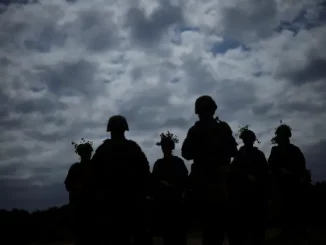
| Published July 7, 2025
Two decorated American veterans narrowly survived a grenade attack in Gaza while distributing food to starving civilians—an assault that has sent shockwaves through both humanitarian and diplomatic circles. As tensions simmer between Israel and Hamas amid fragile ceasefire negotiations, the incident has reignited debate over the risks of U.S.-backed aid operations in conflict zones. With accusations flying and operations under review, the blast in Khan Younis marks more than just a security breach—it’s a flashpoint in the politicization of aid, where even relief efforts are no longer safe from the fog of war.
🎯 What Happened
-
On July 5, during a food distribution in Khan Younis, two highly decorated American veterans working as security contractors for the Gaza Humanitarian Foundation (GHF) were wounded when two assailants tossed grenades at them after the distribution ended. The injuries were reported as non–life-threatening, and both are in stable condition
-
GHF and U.S. authorities accused Hamas of orchestrating the attack. GHF released images of grenade fragments packed with ball bearings, claiming they were “commonly used by Hamas,” and noted prior warnings that Hamas had even placed bounties on GHF personnel
-
A Hamas-run media office categorically denied involvement, calling the U.S. accusation misleading and an attempt to justify ongoing strikes and blockade policies
📋 Broader Humanitarian Context
-
The Gaza Humanitarian Foundation, launched in February 2025 with U.S. and Israeli support, operates distribution sites in southern Gaza. It has delivered tens of millions of meals (52 million by early July, some reports suggest ~60 million)
-
The UN and other humanitarian organizations have criticized GHF for circumventing standard aid channels and raising neutrality concerns. They’ve reported numerous civilian casualties near GHF sites—over 400 killed attempting to access aid since the blockade lifting in mid‑May
-
Allegations have surfaced regarding excessive force by private contractors and Israeli security around GHF sites, including the use of live ammunition and pepper spray against desperate crowds
🔍 Why It Matters
-
This attack marks a significant escalation in the targeting of American personnel in Gaza and spotlights the deepening security and political complexities of private U.S.-backed aid operations in war zones.
-
Occurring amid intensifying ceasefire efforts—Israel sent negotiators to Qatar on July 6 and both sides are reportedly receptive to a U.S.-brokered 60‑day truce—this incident adds pressure to an already fragile process.
-
The incident underscores ongoing debate about how humanitarian aid is delivered and the risks posed to civilians, contractors, and volunteers in conflict zones.
 Resulting Effects
Resulting Effects
🔥 1. Escalation of Tensions
-
Increased Hostility Toward U.S. Presence
The attack signals growing resentment from militant factions—especially toward U.S.-linked aid projects like the Gaza Humanitarian Foundation (GHF), which some view as part of a broader Western-Israeli alliance. -
Potential for Retaliatory Measures
Israel or U.S.-aligned forces may ramp up security crackdowns or airstrikes in retaliation, especially if evidence ties Hamas directly to the attack.
🛡 2. Heightened Security Measures
-
GHF Operations Under Review
Security protocols around aid distribution sites are likely being revised, possibly delaying further humanitarian deliveries. Increased militarization may reduce aid access for desperate civilians. -
U.S. and Israeli Forces on Alert
U.S. and Israeli defense agencies may increase surveillance and possibly expand protective operations around aid sites, raising the likelihood of further clashes.
🌍 3. Diplomatic Fallout
-
Strained Ceasefire Talks
With Israel and Hamas negotiating in Qatar, this attack could derail or complicate efforts toward the proposed 60-day truce, particularly if Hamas is blamed and pressured to respond publicly. -
International Scrutiny of U.S. Aid Approach
Critics—especially from the UN and humanitarian NGOs—are intensifying their concerns about the militarization of humanitarian work and the dangers of bypassing neutral aid channels.
📉 4. Reputational Impact
-
Hamas Accused of Undermining Civilians’ Access to Aid
If held responsible, Hamas risks alienating Gazans dependent on food and medicine. Targeting GHF could be seen as prioritizing political image over survival needs. -
U.S. Aid in a Negative Spotlight
Though GHF has provided over 50 million meals, its close alignment with U.S. military veterans and Israeli logistical backing makes it a symbol of foreign interference in Palestinian eyes—undermining soft power diplomacy.
🧩 5. Humanitarian Consequences
-
Disruption of Food Distribution
GHF may pause or reduce operations, deepening the crisis for civilians who rely on U.S.-backed aid—especially in southern Gaza where supplies are already thin. -
Volunteer and Contractor Withdrawal
International workers might hesitate to continue in Gaza, leading to a shortage of experienced personnel, which further strains aid delivery networks.
 Bottom Line:
Bottom Line:
The grenade attack on American aid workers in Gaza marks a dangerous turning point in the already fragile intersection of humanitarian relief, military influence, and political conflict in the region. While the Gaza Humanitarian Foundation has delivered millions of meals to starving civilians, its association with U.S. and Israeli entities has made it a high-profile target—turning aid delivery into a battlefield.
This incident highlights the growing risks faced by foreign personnel operating in politically volatile environments and underscores the challenge of maintaining true neutrality in humanitarian efforts. As ceasefire talks hang in the balance and aid groups face mounting pressure, the attack not only endangers lives but also threatens to derail a fragile effort toward peace and recovery.
Unless all sides recommit to protecting humanitarian missions and de-escalating conflict, aid workers—and the civilians who depend on them—will remain trapped in a deadly crossfire.
SOURCES: THE GATEWAY PUNDIT – Hamas Grenade Attack Injures 2 Highly Decorated US Combat Veterans Helping Deliver 63 Million Meals to Gaza
FOX NEWS – American veterans attacked, injured while distributing aid in Gaza with US-backed group
REUTERS – US blames Hamas for attack that hurt two US aid workers in Gaza





Be the first to comment